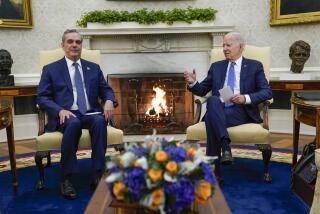NAFTA South
- Share via
President Clinton must seize the moment on hemispheric trade and use the forum of this weekend’s second Summit of the Americas to put U.S. policy back on track. He should pledge to the 34 heads of state assembled in Chile that he’ll fight in Congress for an extended free trade agreement and the “fast-track” negotiating authority to make it work.
At the initial Summit of the Americas in Miami in 1994, Clinton announced he would seek to extend the North American Free Trade Agreement to include Chile by 1995. His deeds, however, have not matched his words. The president failed to persuade Congress to grant him fast-track, the authority to negotiate a trade deal without it being subject to chipping away by special interests in Congress. Most observers say Clinton failed because he did not push hard enough. Fast-track was granted to presidents from 1974 to 1993.
Now Clinton has a second opportunity to state clearly his unequivocal commitment to trade liberalization in the hemisphere. That is exactly what the 34 heads of state in Santiago will seek, and that is precisely what Clinton should do to keep his 1994 promise and restore Latin American trust in Washington. Trade is the glue that can hold this hemisphere together.
Thomas McLarty, the White House advisor on Latin America, declared in recent days that the talks on free trade can advance without fast-track. That might be so, but without fast-track the gain will be measured in mere inches. McLarty’s comment seemed to signal that once again Clinton will go only halfway.
Washington’s trade goal should be clear in this case, and NAFTA offers the model. Admittedly, NAFTA gave rise to many doubts and heavy resistance from American labor unions that have since seen some jobs go south of the border. The employment losses hurt, but overall both the Mexican and American publics have gained greatly from the agreement.
With a presidential election in 2000, the U.S. political environment is another factor affecting prospects for a free trade accord with Latin America. Many in the Democratic Party, organized labor and environmental groups are adamantly opposed to any extension of the North American Free Trade Agreement, each for different reasons. They do have points. For example, global trade shifts low-wage, low-skill jobs out of the high-cost U.S. economy. But on balance, international trade creates more new jobs and those that are created pay better.
The U.S. economy is up more than 17% since 1990, and inflation and unemployment are at the lowest levels in 24 years. Since 1992, more than 14 million new jobs, net, have been created in the United States. Among the causes is NAFTA, which since going into effect Jan. 1, 1994, has surpassed even the most optimistic forecasts. Total trade among the three partners--the United States, Canada and Mexico--rose from $293 billion in 1993 to more than $475 billion in 1997.
Achieving the same success on a hemispheric scale is a challenge that should be tested. Already U.S. exports to Latin American countries are increasing at a rapid pace, tripling from $46 billion in 1988 to $134 billion in 1997.
Free trade benefits all players. President Clinton must take that line in Santiago this weekend and press Congress for fast-track authority on his return. Free trade with Chile should be the starting point. There is everything to gain.
More to Read
Sign up for Essential California
The most important California stories and recommendations in your inbox every morning.
You may occasionally receive promotional content from the Los Angeles Times.










